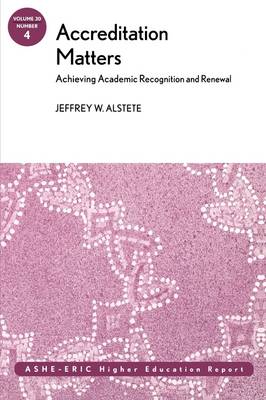ASHE Higher Education Report
1 primary work
Book 4
This book focuses on contemporary accreditation, why it matters, and how it can be done effectively. The author covers historical background, getting started on your campus, strategies for achieving accreditation, and visions for future academic success, with plenty of specific examples and case studies. Accreditation is the primary way of ensuring the quality of higher education to its many constituencies. This self-regulating system of institutional peer review is surely better than direct government oversight, but critics say the current system is a compromise between accreditors and colleges presidents, rather than a rigorous set of common standards. Is today's accreditation meeting our needs? The public want assurance of quality. The legislators want accountability and results. The faculty want a smooth process and recognition for their hard work. Plus there are new faces on campus - quality initiatives, such as the Academic Quality Improvement Project and the Malcolm Baldrige awards - in addition to focused self-studies, coordinated evaluations with other agencies, and new models of periodic review.
This monograph is Volume 30, Issue 4 of "The Ashe-Eric Higher Education Report", the bi-monthly series published by Jossey-Bass.
This monograph is Volume 30, Issue 4 of "The Ashe-Eric Higher Education Report", the bi-monthly series published by Jossey-Bass.
